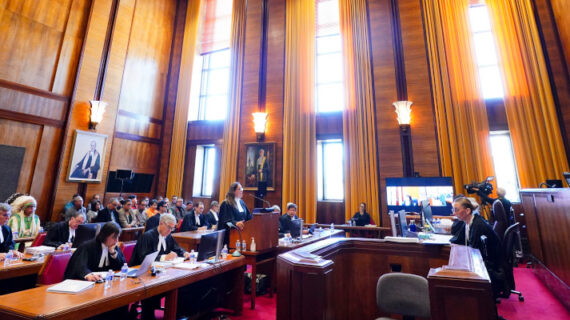- Nova Scotia's Progressive Conservatives triumphed over the Liberals in a byelection in Preston, a riding held by the Liberals for the last 20 years.
- Stephen Moore, who worked for Liberal Premier Stephen McNeil, says the provincial Liberals became too close to the federal Liberals, whose carbon tax plan is unpopular in Atlantic Canada.
- David Tarrant says these frustrations will reverberate across Canada, and could cost the Liberals seats in the next federal election.
In what could be a troubling sign for Prime Minister Justin Trudeau, a byelection this week in Nova Scotia, fraught with debate about the carbon tax and the state of the Liberal brand, ended in a once-safe provincial Liberal seat being lost in a landslide to the Progressive Conservatives.
As the federal Liberals grapple with the soaring cost of living and sagging poll numbers, political veterans across the Atlantic provinces say the byelection result could be a sign of things to come across Canada.
“It’s not uncommon for perhaps a swing riding to flip in a byelection, but for what had been a relatively safe seat to flip is something bigger,” says Stephen Moore, who served as director of communications for former Nova Scotia Liberal Premier Stephen McNeil.
The riding of Preston had been held by the Nova Scotia Liberals for the last 20 years, but the byelection saw their support collapse with the Liberal candidate placing third behind the Progressive Conservative winner and the NDP runner-up.
The Progressive Conservatives heavily focused on criticizing what they described as the “Liberal carbon tax,” which PC Premier Tim Houston has been vocally opposed to.
Chad Bowie, a Conservative consultant and political commentator, says federal Conservative leader Pierre Poilievre, a staunch critic of carbon taxes, has reason to be encouraged by the Preston byelection result.
“We know that the Liberal carbon tax was a key issue in this byelection, and one of the key vote drivers, so of course, I think there could be ramifications. Perhaps even a sign of things to come,” says Bowie.
There have increasingly been signs that Atlantic Canada, which was a stronghold for the Liberals in the 2015 election and has mostly stayed red since, is wavering. A recent poll by Abacus Data found the Liberals in the unenviable spot of lagging behind in all regions of the country, with the Conservatives leading in Atlantic Canada and the Bloc Québécois leading in Quebec.
There are also signs the Liberals are circling the wagons in ridings and regions that have previously been bulwarks. Both cabinet ministers from Newfoundland and Labrador were retained with increased portfolios. The Nova Scotian MP Sean Fraser was promoted to housing, one of the most visible and thorny cabinet jobs as the country copes with a housing crisis.
And as ire on the east coast about the carbon tax mixes with general frustration about inflation and the cost of living, the Conservatives could see an opportunity to tear down the Liberal “red wall” in the Atlantic provinces.
“I do think that the Tory decision to call the byelection just as the federal carbon tax was coming into place was likely a wise political calculation on their part, but certainly one that would have stung the Liberal brand,” says Moore.
David Tarrant lauds Twila Gross, the PC challenger in Preston, for a strong campaign but says external factors also helped turn Preston’s voters against the Liberals.
“The biggest additional force is, without question, the carbon tax,” says Tarrant. “This summer for the first time, Nova Scotians felt the full vice of the Trudeau Liberal carbon tax, with immense pressure and pain to peoples’ cost of living, and the rather indifferent response from the federal government and the prime minister has massively damaged the Liberal brand in Nova Scotia.”
A recent Nanos Research poll found 73 percent of Canadians surveyed in Atlantic Canada believe it is the wrong time to implement a carbon tax. Canada-wide, the poll found just 32 percent of Canadians surveyed believe carbon taxes are an effective way to reduce carbon emissions.

Unlike the Ontario Liberals, who are operationally independent of the federal Liberals despite strong grassroots ties, the Nova Scotia Liberals are an official branch of the federal party. The NSPCs and the federal Conservative parties are not organizationally linked, even if both parties’ members hold overlapping memberships.
“I think the big lesson from the byelection is two-fold,” says Bowie. “First, Tim Houston’s brand of progressive, pragmatic conservatism is a winning formula in Nova Scotia, and secondly, Zach Churchill has a Justin Trudeau problem.”
Tarrant says Preston’s voters did not differentiate between the provincial and federal Liberal parties when it came to their frustrations about the carbon tax.
“A key issue that the PCs ran on was the carbon tax and gas prices, and the people I talked to said it was getting amazing traction,” says Tarrant. “No other single issue drove this more than the carbon tax.”
Tarrant says the negative reaction to the federal carbon tax will be felt in all parts of Canada, with the exceptions of B.C. and Quebec which implemented their own provincial carbon taxes years ago.
“In every other part of the country, particularly rural, suburban, small town parts, if I’m a federal Liberal caucus member, the number one drag on the LPC right now is the carbon tax,” says Tarrant. “It’s gonna cost them seats… if I’m a provincial Liberal, one of my big strategic dilemmas is how do I separate myself from the national party?”




